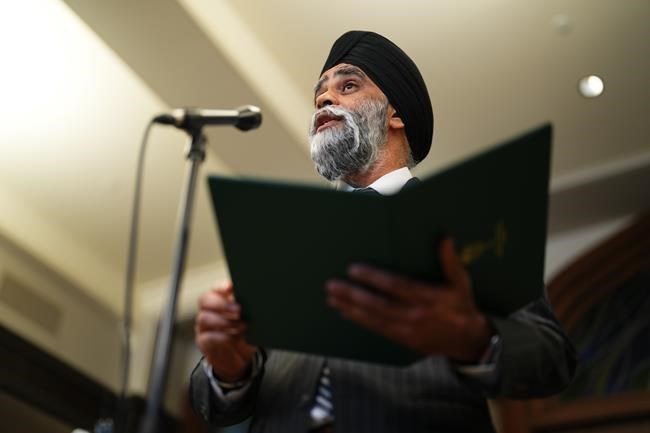OTTAWA — International Development Minister Harjit Sajjan says his government might boost foreign aid spending if the Canadian economy rebounds after criticism over a drop in development funding that has the sector preparing to cut programs.
"The stronger our economy, the more we can do around the world," Sajjan said in an interview Thursday in his first public comments since last month's budget called for a 15 per cent drop in aid funding.
The Liberals are planning to scale back their official development assistance by $1.3 billion, but he echoed Finance Minister Chrystia Freeland in saying that this doesn't amount to a cut.¬Ý
Sajjan said the $6.9 billion pledged for this year is more than the $6.6 billion allocated in the last pre-pandemic budget in 2019.
The aid sector has pushed the government to instead build on the more than $8 billion they allocated for aid spending last year, as a result of two years of extra funding to respond to COVID-19 and Russia's invasion of Ukraine.
The budget announced $8.3 billion in new programs overall, with a focus on the green economy.
"Rightfully so, we needed to focus on our economy. We wanted to send a very strong message on the importance of the investment that we're making for our economy," Sajjan said.
"What we're doing now is realigning where the (development) budget has been."
Prime Minister Justin Trudeau's government was elected on a 2015 promise to increase Canada's international development assistance each year, a commitment he reiterated in his late 2021 mandate letter for Sajjan.
The minister said the developing world is in critical need as it tries to recover from COVID-19 and inflation.
"Because of COVID, we need to reinforce health systems. We need the same thing when it comes to food security (to) build greater capacity, rather than just strictly trying to send food through a supply chain that has been significantly disrupted," he said.
"Even when times might be tough at home, it's still our responsibility to support the vulnerable around the world."
He noted that the amount set out in budgets is often topped up as the government pledges funding through the year to respond to humanitarian disasters.
"We will still look at those challenges and be there for the developing world where it's needed," he said.¬Ý
"We look at which programs are expiring, where the pressures are, where the disasters are taking place, and make further investments."
But the aid sector says it will need to end some Canadian projects abroad, and that holding out for more cash means a backsliding in programs that need years of support to make a sustainable impact on disease, hunger and women's rights.
"It goes against the very ambitious and bold leadership rhetoric that we've heard from the government," said Martin Fischer, World Vision Canada's policy director.
"It's a cut based on if we take last year's commitments as the baseline."
His charity is particularly concerned about the Charlevoix education initiative that Canada pioneered in 2018, which allocated funding from Canada and its allies to ensure the most vulnerable girls in conflict settings can still go to school.¬Ý
"There are the most vulnerable girls arguably in the world, impacted by conflicts, that have because of those projects been able to go to school, become leaders in their communities and break gender norms where they're being held back."
For example, the charity has partnered with the group Make Music Matter in the Democratic Republic of Congo to shore up the mental health of youth in remote locations who have survived conflict and sexual violence, and help them attend school.
"You can't just be bold in your rhetoric when you fly around the world and then not provide clarity of how you're going to step up in implementing those political commitments," Fischer said.
"We all collectively have a hard time understanding how a sector that is providing the government with opportunities to show up internationally, to employ a whole bunch of Canadians and be part of its global role is given no certainty through the regular budget cycle."
Fischer questioned why the budget didn't at least commit to upholding Charlevoix programs that are about to sunset. Sajjan responded by noting renewed Canadian funding in February for girls at the Education Cannot Wait summit.
The minister insisted that the government will fulfill its commitments, even if that only means for a few months for projects awaiting renewal.
"All the programs that we have are going to be continuing," he stressed, adding that Ottawa is improving reporting on the actual outcomes of foreign aid, after federal auditors found the department does a poor job tracking anything beyond how much money gets spent and how many people are reached.
Sajjan did not say whether he's heard of any development organization in Canada that is happy with this year's budget.
"I don't really get into that, in terms of looking at 'this group is saying we're doing great work.' What I want to do is just to focus on the work that we're doing."
The aid sector has been left grappling with how to respond. At a workshop this week held by Cooperation Canada, aid groups pondered the balance between letting the public know about programs that are being cut back, and holding back in the hopes of more funding.
This report by The Canadian Press was first published April 7, 2023.
Dylan Robertson, The Canadian Press




